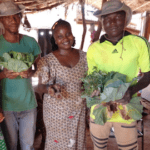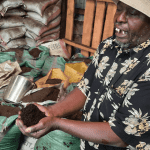Post-Harvest Food Loss Is a Key Driver of Malnutrition: These Innovations Are Tackling the Problem in Indonesia’s Fish Value Chain
Food loss is a big challenge in Indonesia, amounting to up to 300 kg per person per year and comprising about 20% of agricultural crops and 30% of fisheries products. Despite their abundance in Indonesia, loss of fresh fish is a particular problem, with an estimated 20 – 29% of fish lost annually in the domestic supply chain.
The loss of protein and micro-nutrient-rich foods like fish on this scale reduces the availability of safe and affordable nutritious food for the local population, contributing to high rates of malnutrition and harming livelihoods. The Global Alliance for Improved Nutrition (GAIN) estimates that the annual loss of fresh fish equates to 16,500 – 27,500 metric tons of protein, which is equivalent to the daily needs of 2.7 – 4.4 million children in Indonesia.
This is significant given that 31% of children under the age of 5 years are stunted (i.e.: they have short height for their age) and 10% suffer from wasting (i.e.: they have low weight for their height), both of which are caused by chronic malnutrition. Food loss also has an economic and environmental impact. Moreover, less availability combined with higher costs of production due to loss likely mean that consumers end up paying more.
Limited cold chain infrastructure is increasing post-harvest food loss
Inadequate cold chain infrastructure (including refrigerated storage and transportation) and poor handling practices lie at the heart of post-harvest losses in Indonesia’s domestic fish value chain. Indonesia’s current cold storage capacity can only accommodate around 500,000 tons of seafood: To store all the fish the country produced in 2020, it needs to be able to support at least 15.5 million tons. Without appropriate cold chain facilities, fish cannot be kept at the right temperature to maintain its freshness and nutritional content as it moves through markets and processing factories before reaching consumers.
While large companies have the resources to invest in their own cold chain infrastructure, micro- and small-scale businesses along the fish value chain have limited access to affordable and appropriate cold chain and food processing solutions. One factor contributing to this gap is the lack of a dynamic domestic cold chain technology sector. Small domestic companies with promising technologies have historically lacked access to financial resources, markets and advice to bring scalable solutions to market.
Furthermore, despite the country’s rich resources, there is a lack of demand from Indonesian consumers – particularly those who live in major cities or far away from the coast. In fact, Indonesians eat less fish than consumers in Thailand, despite benefiting from greater fish supplies – in part because fish is much more expensive than cereals in Indonesia, when compared to Thailand.
Co-creating and scaling cold chain, processing and product innovations
Recognising that the problem of food loss in the fish value chain cannot be tackled in siloes and requires coordinated action, the Indonesia Postharvest Loss Alliance for Nutrition (I-PLAN) was created in 2017 to bring together the expertise and resources of GAIN, the Indonesian Ministry of Health, the Ministry of Marine Affairs and Fisheries, and a diverse range of business, academic and civil society organisations.
From the outset, I-PLAN has set itself three objectives: to improve the domestic supply of nutritious food by reducing the post-harvest loss of fresh fish; to increase access to improved post-harvest technologies and best practices and enable businesses to take advantage of market opportunities; and to bring together key stakeholders to align resources and know-how on reducing food loss. Our primary activities have focused on two areas: establishing a multi-stakeholder alliance called Jejaring Pasca-Panen untuk Gizi Indonesia (JP2GI) to tackle fish loss, and helping to catalyse cold chain and food processing innovations through an innovation challenge.
JP2GI now has more than 600 members comprising the Ministry of Marine Affairs and Fisheries, fishermen, distribution, processing and retail businesses, cold chain technology companies, industry associations, nutritionists, health workers, and academic organisations. The platform fosters the development of innovative cold chain solutions and fish-based products, and supports capacity building, including technical training and access to international cold chain and food processing industry expertise. It hosts regular networking meetings for members, and provides a forum for research and the development of policy to strengthen the enabling environment for reducing post-harvest loss. In addition, it has established partnerships with local financial institutions to facilitate greater access to finance and investment for member businesses.
Alongside JP2GI, I-PLAN has established a successful Business Innovation Challenge competition, through which participating small businesses with promising technologies can receive seed funding, technical support and access to networks, connecting them with potential sources of investment and market opportunities.
The winner of the Innovation Challenge in 2018 was a company called Cold Bank Maslaha, which has developed technology that replaces ice as a means of preserving perishable foods. Since the competition, the company has received mentoring, training and investment to build a new factory. It has also signed a memorandum of understanding with the Indonesian Cold Chain Association and an Indonesian railway association to preserve fresh and frozen goods delivered by rail.
In 2019, I-Fit Fish Cereal, a producer of nutritious fish-based cereal, was named the competition winner. The company has since received technical support and grant funding, in addition to securing distribution with local retailers. Its sales have grown quickly, increasing by 8,350 boxes from January to July 2020 and generating revenue of IDR 170,600,000 (USD 12,100).
Since its launch in 2017, I-PLAN has either met or exceeded all its targets. Its notable achievements include training over 300 individuals on improved post-harvest loss practices and technologies, helping over 100 companies apply improved post-harvest loss practices and technologies in their businesses, and identifying over 500 post-harvest loss innovations.
I-PLAN underlines the value of multi-stakeholder platforms in catalysing collaboration and solutions that address the complex root causes of post-harvest loss in Indonesia’s food system. One of its most notable achievements has been to strengthen collaboration between the Ministry of Health and the Ministry of Marine Affairs and Fisheries, creating stronger alignment and coordination between fisheries and national health and nutrition policy priorities.
With robust foundations now in place, JP2GI is looking to replicate its success in other nutritious agri-food sectors, which also experience high levels of post-harvest loss, such as fresh fruits and vegetables. GAIN will continue to support Indonesian and global efforts to reduce malnutrition by improving the consumption of nutritious and safe food for all people, especially the most vulnerable.
Further information on the I-PLAN initiative can be found here.
Rahmi Kasri is a Senior Programme Manager at I-PLAN, GAIN Indonesia.
Photo courtesy of Devi Puspita Amartha Yahya.
- Categories
- Agriculture, Transportation



